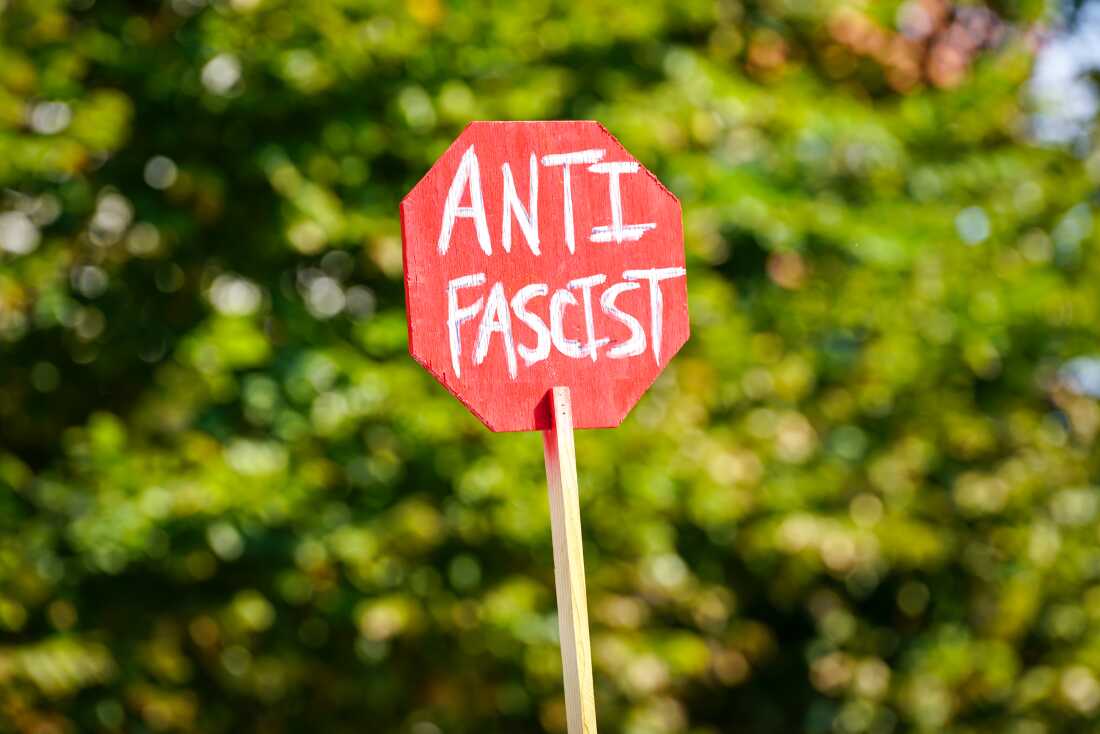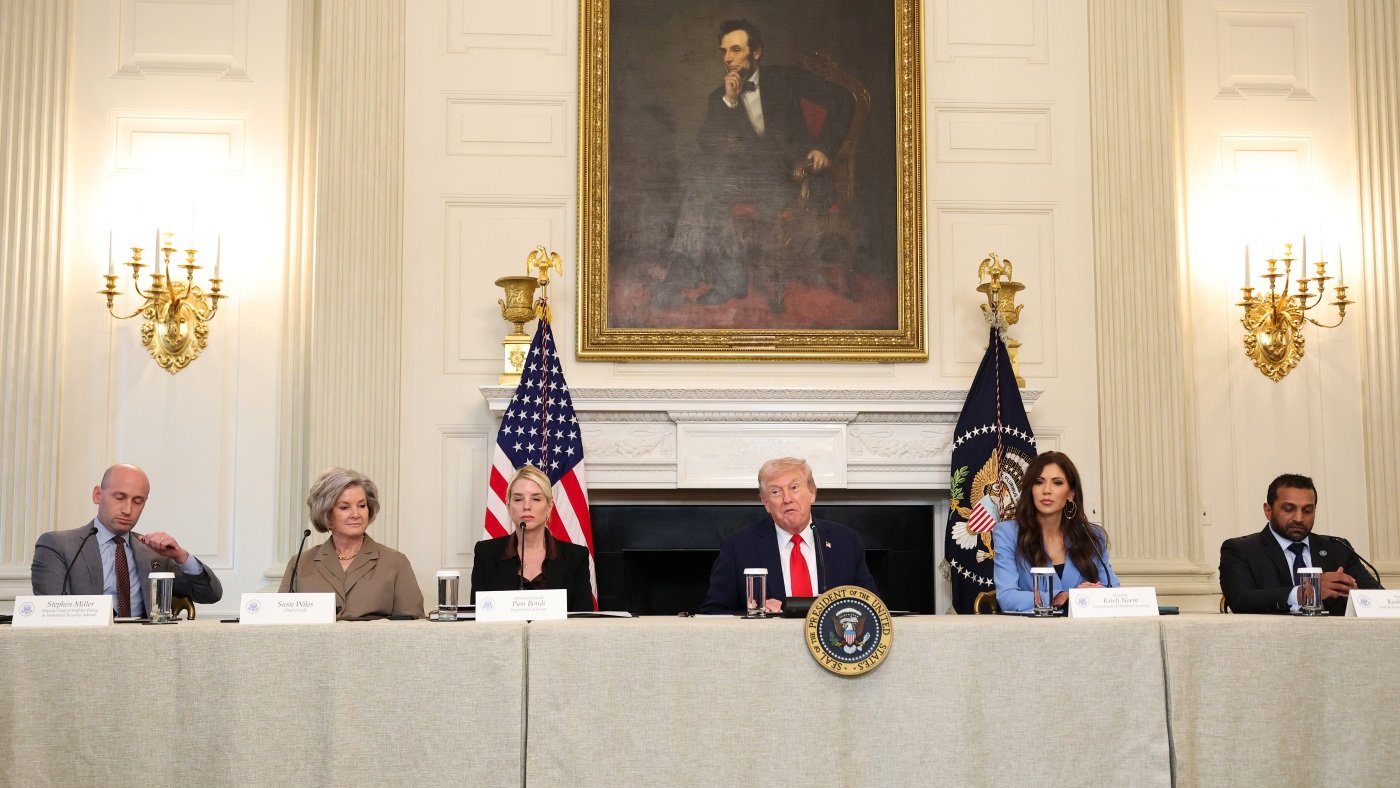
President Trump speaks as (L-R) White House Deputy Chief of Staff Stephen Miller, White House Chief of Staff Susie Wiles, Attorney General Pam Bondi, Secretary of Homeland Security Kristi Noem and Federal Bureau of Investigation Director Kash Patel listen during a roundtable discussion at the White House on Oct. 8. The administration held the roundtable to discuss the antifa movement after the president signed an executive order designating it as a “domestic terrorist organization.”
Anna Moneymaker/Getty Images
hide caption
toggle caption
Anna Moneymaker/Getty Images
Earlier this month, President Trump hosted a roundtable at the White House about antifa, the far-left movement or ideology opposed to fascism. Some of the right-wing influencers gathered around the table urged him to designate antifa as a foreign terrorist organization.
“Would you like to see it done?” the president asked. “You think it would help? I’d be glad to do it. I think it’s the kind of thing I’d like to do. Does everybody agree? If you agree, I agree. Let’s get it done.”
Trump then turned to Secretary of State Marco Rubio and said, “Marco, we’ll take care of that.”
Trump has already issued an executive order that labels antifa a domestic terrorist organization, but the impact of that is unclear since there is no federal legal provision to designate domestic terrorism groups.
The State Department does have the authority, however, to designate foreign terrorist groups, a move that has real legal teeth. If the Trump administration were to take that step against antifa, it would likely have massive implications.
“It would have a legal impact that would have a cascading effect across civil society, including social media organizations, civic organizations and everything in between,” said Thomas Brzozowski, the former counsel for domestic terrorism at the Justice Department.
“It would effectively criminalize activity that is associated with a diffuse — I hesitate to use the term organization — but more of an ethos or a shared collective dissent to a lot of what the administration is doing.”
Trump has made no secret of his antipathy for the political left
During Trump’s first term in office, he blamed far-left radicals and antifa for violence in cities during social justice protests after the police killing of George Floyd in Minneapolis.
The Justice Department tried to figure out then if there was a funding network or leadership structure for antifa but never presented evidence of either.
The FBI director at the time, Christopher Wray, testified before Congress in 2020 that antifa is not a group but rather an ideology, while also stating that the bureau did have investigations into people who identify as antifa.
This year, after the assassination of conservative activist Charlie Kirk, Trump said there are “radical left lunatics out there and we just have to beat the hell out of them.”
Deputy White House Chief of Staff Stephen Miller recently said the Democratic party “is not a political party. It is a domestic extremist organization.”
Miller, who was at the White House roundtable, was asked by Trump about possibly designating antifa as a foreign terrorist group.
In response, Miller claimed antifa has “extensive” foreign ties and said designating it “would be a very valid step to take.”
The secretary of state designates a foreign terrorist organization based on certain legal criteria: Is the entity in question an organization? Is it foreign? Is it engaged in terrorism against Americans or American national security interests?
Based on those criteria, it would be difficult from a legal perspective to designate antifa a foreign terrorist organization, said Jason Blazakis, who for a decade led the State Department office responsible for designations under the Obama and first Trump administrations.
“First and foremost, antifa is not necessarily an organization. It is at best a movement of disparately linked individuals who are united based on an ideology, which is a belief that fascism is bad,” Blazakis said.
Antifa isn’t a functioning, cohesive organization like ISIS or al-Qaida, he said, which had clear leaders and a hierarchy.
“I would really call on the State Department or the U.S. government to tell us who the leader of antifa is and where they are based,” he said. “We’ve not heard anybody from the administration really talk about antifa’s leadership and its organization structure.”
Even if officials were to try to characterize antifa as a formal group, senior administration officials have repeatedly described it as inherently domestic, which would make it difficult to suddenly declare it a foreign entity, Blazakis said.
Still, he acknowledged that the Trump administration could push a designation over the line if the president wants it to happen.
Far-right allies in Hungary and the Netherlands, for example, have made statements — echoing Trump — about declaring antifa a terrorist organization.
The administration could point to those, Blazakis said, to “try to make a creative argument that there is some foreign-based nexus that exists here.”

A protest sign held by a demonstrator at a rally at the Atlanta Civic Center on Oct. 18 in Atlanta.
Julia Beverly/Getty Images
hide caption
toggle caption
Julia Beverly/Getty Images
“It’s not necessarily something that we can ignore as a possibility that this administration, they want to pursue, essentially just stretch the truth, to fit its policy objective, in this case going after left-wing or progressives through the lens of using counterterrorism tools,” Blazakis said.
Asked whether the State Department had begun the process of designating antifa, a department spokesperson said: “Antifa represents a dangerous threat to law and order. The United States has a variety of options available to target terrorists and terrorist organizations, and the State Department will use all available tools to keep Americans safe.”
Criminal charges could begin with material support
If the Trump administration does designate antifa a foreign terrorist group, the reverberations would likely be huge, starting with the ability of federal prosecutors to bring the criminal charge of material support to a designated terrorist organization.
This has been a standing charge against ISIS and al-Qaida supporters, and it carries a penalty of up to 20 years in prison.
Material support has been broadly defined over the years; it can mean everything from financial or educational support to something as small as a bottle of water or a $10 gift card.
The law also extends to activity between two people just talking about providing material support to a foreign terrorist organization, which is cause for concern with a nebulous term like antifa, said Brzozowski, the former counsel for domestic terrorism at the Justice Department.
“When that foreign terrorist organization is so ill defined and nobody even knows what it is, and it potentially includes all activity that can be painted as left wing or whatever term you’d like to hang on it, that becomes potentially catastrophically dangerous for anybody, for everybody,” Brzozowski said.
There are also potential ripple effects.
Social media companies, for example, take their cues from the government on which groups are dangerous. If antifa is designated, social media companies would likely take steps to restrict any communication that could be seen as related to antifa, Brzozowski said.
The companies also would likely build mechanisms to affirmatively report such activities on their platforms to the government.
“The social media piece is super important,” Brzozowski said. “That really in today’s environment obviously is going to dictate in many respects what the broader public sees and what they don’t see. So that’s going to have an immediate impact on public discourse across the board.”
Universities, meanwhile, could cancel conferences that touch any topic that might be viewed as related to anti-fascism, and faculty research could be curtailed, Brzozowski said.
Then there are the insurance firms that insure universities, nonprofits, progressive think tanks and foundations.
“They’re not going to insure these institutions if they touch anything that remotely concerns anti-fascism,” Brzozowksi said. “And think about how broad that is. What does that even mean? It sounds crazy, Kafkaesque, but that’s what this designation would bring into play.”
All of these ripple effects depend, of course, on the Trump administration following through and designating antifa a foreign terrorist organization.
In Brzozowski’s view, there’s good reason to believe the administration will.
“The president himself during a roundtable at the White House turned to his senior advisers whose job it is to designate these entities and instructed them to do it, on TV,” he said. “So yeah I think they might do it. And people are not ready for it. People are not ready for it. If that goes through, I’m telling you, unbelievable.”



Leave a Reply